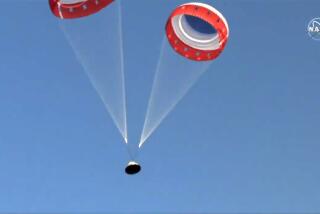Mir Crew Awaits Arrival of Cargo Capsule, Readies for Repair Mission
- Share via
MOSCOW — As an unmanned cargo capsule hurtled toward the crippled Mir space station with repair tools Saturday, U.S. astronaut Michael Foale and his two Russian colleagues readied for a perilous mission that could make or break Russia’s manned space program.
The Progress craft ferrying vital supplies and life-support equipment is expected to dock with Mir early Monday. The three Mir crewmen will then have 10 days to plan and practice for a spacewalk in the dark, cramped Spektr research module that was punctured and depressurized in a June 25 accident.
Adding to the tension and drama surrounding the worst disaster in Mir’s troubled 11-year history, veteran NASA astronaut Frank Culbertson disclosed in Florida on Saturday that hazardous substances may be floating inside Spektr that could imperil the crewmen when they try to repair the damage.
Mir commander Vasily Tsibliyev has reported hearing thumping noises inside Spektr and seeing “a cloud of little white flakes” escaping from the ruptured component into open space, Culbertson told journalists at a news conference in Cape Canaveral.
Mission controllers speculate that Spektr may be leaking radiator fluid or that one of the scientific experiments underway inside the module when it was struck by a cargo drone may have exploded and released a substance.
“We are very concerned about what was in that module, what might have ruptured and what the impact might be on the suited crew members,” Culbertson said, alluding to the planned spacewalk in Spektr later this month.
The complexity of the repair mission became clear Friday with Russian mission control’s decision to delay the operation until at least July 17 so the repair work can be successfully simulated first on the ground.
The consequences of failure are also becoming increasingly apparent: If the three spacemen cannot restore Mir to working order and are forced to flee in the attached Soyuz escape capsule, the power-starved Mir would soon fall from its orbit and plunge back to Earth in a menacing hulk of burning space junk--taking the last hopes for Russia’s space program with it.
Mir is the world’s only manned space station, and as such provides a crucial training center for the international space station Alpha, which is expected to go into operation in 1999.
To keep the cash-strapped Russian space program involved in the Alpha project, NASA has been subsidizing Mir with more than $470 million for cooperative exploration and research projects.
But since Tsibliyev accidentally piloted an overweight cargo drone into Spektr during a manual-docking experiment, the space station has been too short of power for any scientific work to continue and the crewmen have been too distracted by malfunctions to perform the research work for which the station was intended.
Foale, Tsibliyev and flight engineer Alexander Lazutkin repeatedly have had to fire up Mir’s rocket engines to keep the space station in proper alignment with the sun to feed energy to its solar panels. Four of the station’s 10 solar panels were knocked out of use by the accident, forcing the crewmen into a power-rationing routine.
*
Russian and U.S. space officials have sought to cast conditions aboard Mir as demanding but not directly threatening to the lives of the crewmen. But some concede privately that both space programs are under pressure to put every effort into rescuing Mir because abandoning the space station would be a setback to preparations for Alpha missions and would likely deal a death blow to Russia’s limping presence in the cosmos.
“There is too much riding on the fate of Mir for anyone to pull out” before every effort has been made to restore normal functions, said one Western official here.
In addition to the damage inflicted by the docking accident, Mir has been suffering problems with its navigational system. A power-management computer has at least twice switched off energy to the gyroscopes that keep the station’s solar panels oriented toward the sun, forcing the crewmen to use the rocket engines and precious fuel to keep the craft aligned correctly. New stores of fuel are en route aboard the Progress capsule.
The supply ferry, which blasted off from the Baikonur cosmodrome in Kazakhstan early Saturday, is also carrying special spacesuits and cables for rewiring the isolated solar panels to the main power grid.
To reconnect the idled batteries and get Mir back to working order, Tsibliyev and Lazutkin will have to don pressurized spacesuits, crawl through a 2-foot-wide hatch into Spektr and find battery contacts in the darkened module without brushing up against any equipment or sharp-edged contents floating about. Foale’s belongings and most of the NASA computers, data and equipment were in Spektr when it was damaged.
The Progress capsule is also carrying “additional lumination facilities” and alternative spacesuits, the Itar-Tass news agency reported. One repair scenario under consideration would have the two Russians don older, snugger suits for working inside Spektr to reduce the risk of the protective clothing being ripped or damaged by ambient substances, thus exposing the cosmonauts to the deadly vacuum of space.
Despite Mir’s problems, Foale was reported to be in good health and humor during two brief ham radio chats with the commander of the space shuttle Columbia.
Columbia, on the fifth day of its mission, is due back to Earth on July 17.
More to Read
Sign up for Essential California
The most important California stories and recommendations in your inbox every morning.
You may occasionally receive promotional content from the Los Angeles Times.











